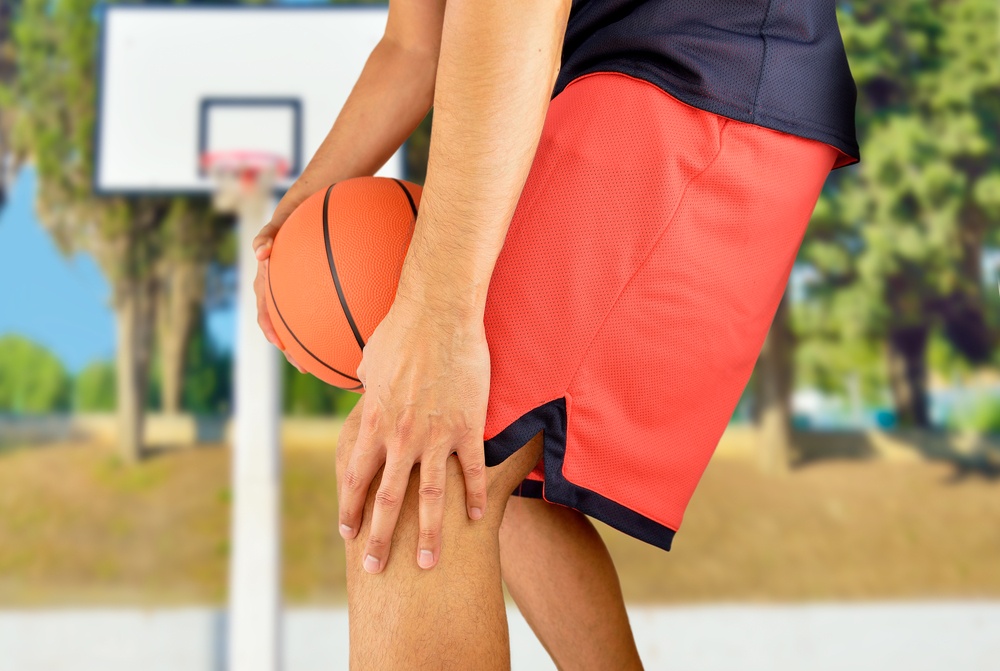Weekend warriors and basketball veterans alike often experience knee pain, especially a specific sports injury referred to as “Jumper’s Knee”. Otherwise known as “patellar tendonitis”, Jumper’s Knee is an inflammation or injury of the patellar tendon, the cord-like tissue that connects the kneecap to the shinbone.
There are two ways to look at this: On the positive side, those who deal with Jumper’s Knee are evidently giving a considerable amount of effort in order to help bring their team to victory. It is not likely that “Charlie the Cherry-Picker” is getting a bad case of Jumper’s Knee on the basketball court. From that perspective, it is a commendable condition in the sense that it insinuates an aggressive competitive nature. Unfortunately, we are not here to focus on the positives of Jumper’s Knee nearly as much as we must focus on the negative impact it can have on day-to-day activities.
1 in 5 athletes for which jumping is a necessary component in their respective sport deal with this condition at some point in their athletic careers. Jumper’s Knee can be caused by overuse, steroid use, a previous surgery, arthritis, or muscular imbalance. There is important information regarding jumper’s knee that should be kept in mind for those that are experiencing knee pain as a result of athletic competition:
- Overuse and an overload of stress on the knee(s) due to jumping on hard surfaces is one of the most common causes for Jumper’s Knee
- Steroid use has been linked to increased muscle and tendon weakness, which could result in a weakened or inflamed patellar tendon.
- Those with Rheumatoid arthritis, a type of arthritis that has the ability to cause chronic pain and inflammation of joints, can be more susceptible to this injury.
Jumper’s Knee can be classified into 4 different symptom stages with the 4th stage being the most severe.
Stage 1: This stage is when pain is experienced after the activity, while at the same time not affecting any kind of knee functionality.
Stage 2: At this point, there is pain during and after the game or string of games. However, the athlete is able to still perform at a respectable level and can consciously feel they may be able to push through the pain. The pain has the potential to affect sleeping habits and activities that require increased loading on the affected knee should be prevented. At this point you should see an orthopedist specializing in the knee, such as Dr. Leon E. Popovitz.
Stage 3: At the third stage, one is developing chronic pain during and after the athletic event, making it difficult to perform at a level that is satisfactory. 3-6 weeks of time off from any increased loading of that knee is recommended. Seeing an orthopedic specialist is also recommended at this stage.
Stage 4: A complete tear in the tendon is present and requires a surgical procedure to be repaired. An orthopedic specialist or practice is required at this stage.
Treating Jumper’s Knee (or patellar tendonitis) correctly is paramount to preventing this condition from recurring. Consulting an orthopedic specialist is a vital component to taking care of this condition as the specialist can examine the severity of the knee injury. In most cases, Jumper’s Knee can be alleviated using a non-surgical treatment regimen that is comprised of physical therapy and activity modification.
NY Bone and Joint Specialists is a top rated, private Orthopedic and Sports Medicine practice with locations in New York City. The Orthopedic Surgery, Physical Medicine & Rehabilitation, and Pain Management specialists routinely perform surgical and non-surgical treatments for professional athletes from across the United States and various other countries. Dr. Leon Popovitz and Dr. Michael Mizhiritsky, along with their team of best in class orthopedic physicians, are known for their exemplary orthopedic surgical skill and best rated physical medicine and rehabilitation program. This, along with their top in-office physical therapy and long-term sports rehabilitation processes, leads to athletes of all levels returning to their top physical potential. Contact us today to schedule a consult!



